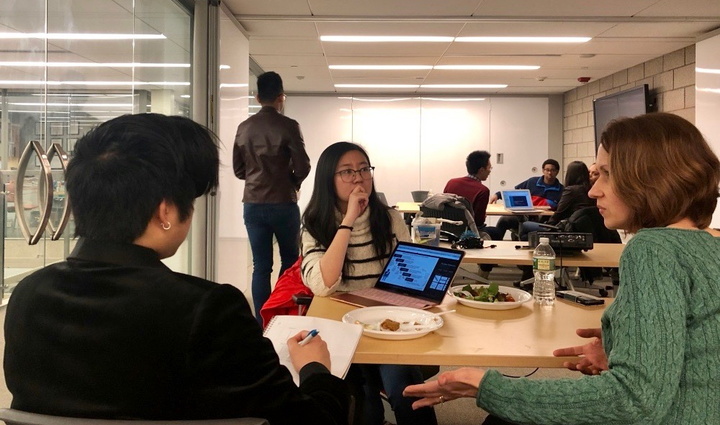Multi-Disciplinary Teams Tackle Health Challenges in MedTech Accelerator
Over the course of seven weeks, in a classroom and the makerspace of the Yale Center for Engineering Innovation & Design (CEID), five multi-disciplinary teams worked to create new medical technologies.

A partnership between the Yale Center for Biomedical Innovation and Technology (CBIT) and Tsai CITY made possible by Jonathan Rothberg, the MedTech Accelerator offered all students, not just those with backgrounds in engineering or medicine, the chance to innovate within the field of MedTech. The teams were assigned to five project areas based on interest, and the project areas — Cardiovascular Health and Diagnostics, Contraception and Sexual Health, Emergency Medicine and Diagnostics, Mental Health and Wellness, and Orthopedic Health and Trauma — brought together students of all backgrounds. Students from the School of Management and the medical school worked with PhD candidates in biomedical engineering and undergraduates studying cognitive science.
On a late February evening three weeks into the program, CITY mentor-in-residence Levi DeLuke, one of five team members running the Accelerator, spoke to students on the evening’s theme: “Prototyping, Testing, Iterating: Making an Idea a Functional Reality.” Levi walked the group through the process of using existing parts to prototype and advised that they build only the novel elements of their design and iterate from there. He also shared his experience of designing a medical device with his company, Wellinks, which he started with his Yale classmate Ellen Su. He and Ellen drew on his own experience having scoliosis as a child to design and create a back brace that uses sensors to give users feedback on how effectively and how long they’ve been wearing it. In addition to sharing his innovation story, Levi provided helpful resources for prototyping and sent the teams off to start building.

The Emergency Medicine and Diagnostics team worked on a device for a venture that already existed, Code Blue. Jennifer Gammond SOM ’19 and Brianna Olamiju MED ’21 started Code Blue in January, after Jennifer saw someone collapse in New York City due to sudden cardiac arrest. “Although there was a lot of pedestrian traffic, no one really knew what to do until the ambulance came much later. Although there were a lot of bystanders in the area, everyone was as clueless as I was,” she says. She then had the idea to create an automated CPR machine. The MedTech Accelerator connected her with Yale College student Rose Bender, who was a certified EMT and knew firsthand how difficult and tiring it was to properly administer CPR. With input from Rose, other team members, and Accelerator mentors, Team Emergency Medicine set out to design a robotic arm to administer correct CPR in public spaces and to outfit ambulances.
Five weeks after Levi’s lecture, at the final build session, the groups continued to tinker with their prototypes and a few presented on their progress. The Emergency Medicine group now had a demo kit that included a backboard, an AED (automated electronic defribillator), and a model of the pump that would power their robotic arm. Meanwhile, Team Ortho/Trauma presented schematics and proposed specifications for an improved cast cutter. Unlike a traditional cast saw, which generates a lot of heat that can cause cast burn, noise, and plexiglass shards, their cast shears would use hydraulic or pneumatic power to break through the thick material. The Cardio Team, “Eschew,” had made progress on developing their vape-toxin-absorbing chewing gum. This team felt that with the increase in vaping, more solutions needed to be developed to address health concerns surrounding the trend. As they polished their prototypes and presentations, the teams had the opportunity to apply for Startup Yale prizes, including the Rothberg Catalyzer Prize, which awards $15,000 to a student venture creating hardware or artificial intelligence (AI) solutions to a medical challenge. As students considered this opportunity and Yale’s other pathways for innovators, they remained focused on making the best possible devices.
Wooje Chang of Team Ortho/Trauma studies mechanical engineering and cognitive science had no background in medical technology coming into the MedTech Accelerator. Taking apart a pneumatic air pistol at the CEID, Wooje observed and reported the design to his teammates while they debated the comparative merits of electric, hydraulic, and pneumatic power. Chang reflected on the experience, “The people I worked with were delightful, and they taught me things I would not have been able to learn on my own.” For Chang and his teammates, the MedTech Accelerator is just the start of this learning process: like several others, Team Ortho/Trauma plans to keep working on their project.